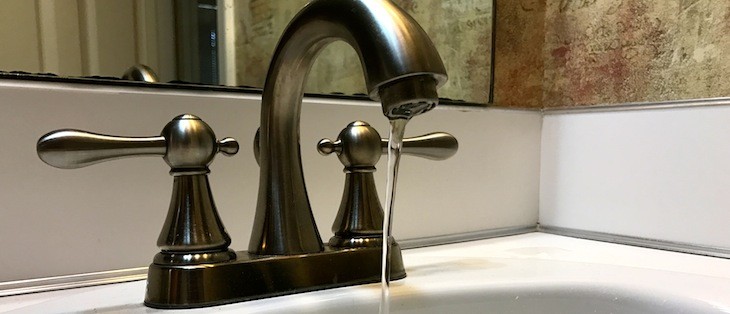Fort Smith water rates could rise by $5 in 2024, $9 in 2025
by April 10, 2024 6:42 am 770 views

The Fort Smith Board of Directors on Tuesday (April 9) agreed to discuss a possible water rate at an upcoming board meeting after being presented a proposal that could raise the average residential water bill by approximately $5 this year and another $9 in 2025.
David Naumann, with Burns and McDonnell Engineering, the company the city hired to do a water rate study in 2023, presented the board with further analysis of the water study they presented in December. In that presentation, Naumann said with the water and sewer department’s approved budget in 2024, the department will have to dip into the department’s reserve funds to cover expenses this year to the tune of approximately $8 million.
Naumann’s presentation suggested that the city look at a rate increase that would raise rates for residential, retail, industrial, outside of city and contract users. The goal, according to the presentation, is to develop a pricing of services that reasonably reflects the level of service provided.
The rate design objectives were to improve residential affordability by amending the existing inclining block rate structure to include a fourth block; expand eligibility for low-income residential rates; create a uniform commercial/industrial volumetric rate; increase outside city retail rates to 1.5X inside city rates; and use the same charges as retail for wholesale rates, Naumann said. He said that on the residential side, around 60% of the accounts use 5ccf of water a month.
“Most residential customers will see less impact, some as low as $1.03,” Naumann said. “Impact to low-income residential customers will be 50% lower.”
Of course, those only seeing a $1.03 are those using less than 1ccf a month and already pay the lowest base rate for water – $4.97. The proposed new base water rate would go up to $6. The proposal suggests the raise increase happen in July.
For those using 5ccf a month, which is the largest group of residential customers, water charges would increase $5.33 a month from $16.37 to $21.70 for water only. Sewer and solid waste fees would remain the same, the report proposes.
“This increase would get water rates up enough to cover the budget this year. Really it just plugs the hole for a while,” Naumann said.
The proposed rates for 2025 would take the base rate up to $6.75 and the rate for 5ccf a month up to $30.95. The proposal included rate increases for 2026, 2027 and 2028 with rates in 2028 for 5ccf a month being $41.83, more than double what residents pay now.
Directors all agreed there needs to be more study over all the expenses in the utility department with an emphasis on how to reduce expenses and charge what is needed in all areas. Director George Catsavis suggested looking at raising the fees for sewer and water taps. Director Lavon Morton said the department doesn’t need to be installing new meters unless the old ones are not working.
“I wouldn’t spend $23 million on new meters,” he said.
He also wants to see another firm look at creative ways to meet the needs in Fort Smith for more water on the few days a year it really needs it.
Director Kevin Settle said the city should let voters decide if they would rather vote in a 1% sales tax to help cover the rising costs of providing sufficient water to the city or have rate increases. Morton said the city cannot afford to wait until November for a sales tax election because funds to be found now.
“(T)he budget shows that we are failing the debt covenants for 2024, the year we are in now. … Failing debt covenants on $200 million of debt is a serious thing for a city of our size. And people know about it. … Once you do that they don’t forget it, so the next time we issue bonds, it’s going to cost of us more money. We are not going to be viewed as a responsible city. We should take into account that in April of 2024, if we do nothing for the rest of the year, we’re going to fail that bond covenant, a serious matter,” Morton said. “I really think we should put rate increases for the first two years on the agenda to be voted on, and we should think about the structure of the sales tax and that if we approve a 1% sales tax, we’re going to be above 10%. I think that is a hard sale. Vote on the first two years, look at alternatives more, and if we decide sales tax bonds need to go, they go in ’25.”
There was a second to his motion to put the subject on an upcoming board agenda for discussion and possible action.
